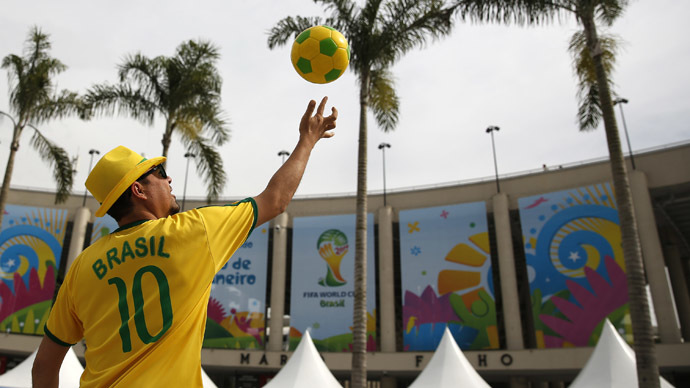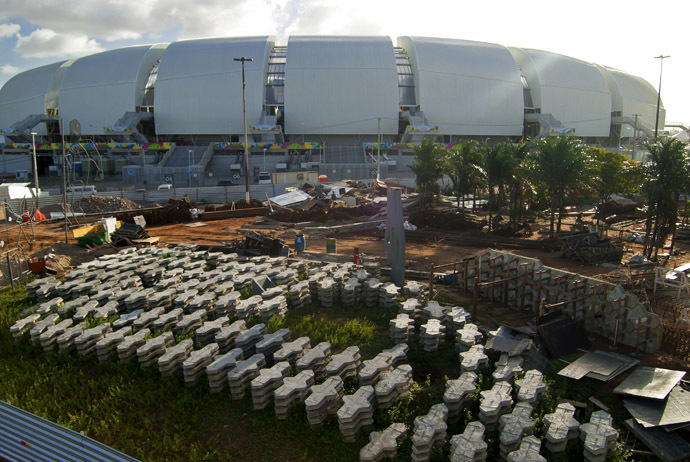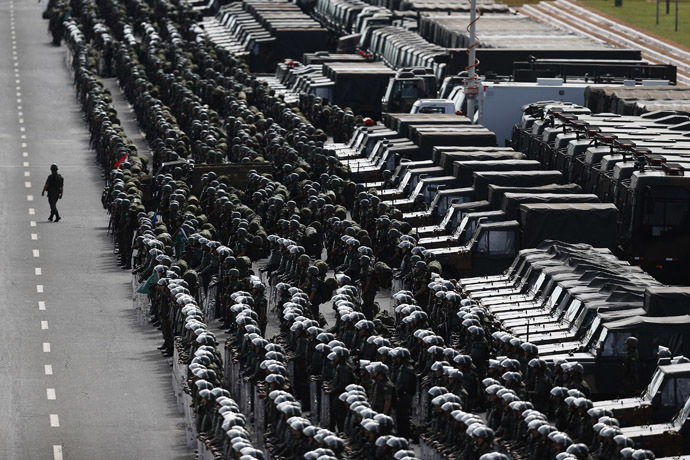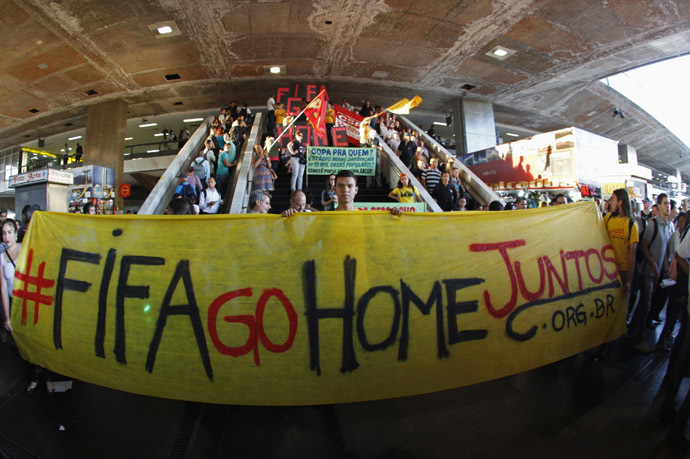Brazil countdown: Get me to the World Cup on time!

It’s high fever time in Sao Paulo. The Dutch are chilling in Ipanema, right in front of the beach. The Italians are in their own Riviera 100 kilometers from Rio.
The Germans are in a sprawling beach bunker along the coast were Brazil was “discovered” in 1500. The English team is visiting a favela this Monday. The whole country is slowly being draped in green and yellow. One hell of a party is about to begin.
And yet, all across the planet, the nagging question remains; will Brazilians set this World Cup – literally – on fire? Is this show worth over $11 billion? Well, that’s actually a non-issue, picked up by those who don't know how football – it's not “soccer”, it’s “football”, as the English invented it – is embedded in the Brazilian psyche.
Emerging from a bulletproof SUV into a trendy Japanese restaurant where she is greeted like Madonna, my good friend Barbara Gancia – arguably Brazil’s top social critic – went for the jugular: “There will be protests until Neymar strikes the first goal. Everybody, no exceptions, will root for the national team. And then, even if Brazil wins the Cup, the protests will pick up again.”
So far, the whole world also knows this has been a glorious mess – a running soap opera featuring everything from corruption at the higher echelons of the FIFA racket to paramilitary police “pacifying” favelas in a Kiev-bombing-Slavyansk mode; from Adidas (joined at the hip with FIFA) and Sony pontificating about bribery to dodgy municipal, state and federal shenanigans where major profiteers have been large construction companies, the top among well-oiled Brazilian lobbies – and yet another case of wealth trickling up, not down.
The mind-boggling complexity of how to concoct a flamboyant carnival out of a logistical nightmare is also typically Brazilian; like one of those nonsensical samba school “plots” displayed with plenty of glitter during Rio’s carnival. At the same time, the legitimate questions won’t go away; why privilege this FIFA-tailored, corporate sport consumption “experience” (or folly) – instead of steady, long-term investments in health, education and public transport?

Walk like a Croatian
I ran a fascinating experiment last Thursday; I decided to go from the fringes of old, decrepit downtown Sao Paulo to the gleaming white, gloriously unfinished Itaquerao stadium – where the Cup starts this Thursday – only speaking English, impersonating a foreign fan. Oops, bad move. That was the day metro workers decided to start an “unlimited” strike.
Everyone I met was invariably helpful, if only via sign language. No metro, so I walked a lot, and ended up in a hellish open air bus terminal, only to be told I would need prodigious amounts of luck to (almost) reach the Itaquerao, and then keep walking. So this is what a Croatian this week or the vast English contingent when they play Uruguay should expect. A taxi is out of the question; drivers told me they plan to charge at least $100 one way on match days.
At the bus terminal I met an extraordinary character, Aden – a bus company controller – who, interrupted every few seconds by hordes of clueless humans looking for their buses, gave me a one-hour crash course on (non) urban mobility in Sao Paulo, stacked with corruption and negligence examples (I temporarily switched to Portuguese so we could have a conversation).
Finally I walked – what else – all the way back to downtown to board the only certified way to get to Itaquerao: the Cup Express train (the metro guys were unable to explain the trains were not on strike…) Well, I could always have pulled a Blatter – as in FIFA’s capo di tutti i capi Sepp the Slick Swiss – who was granted by the Brazilian Air Force the right to breach at will, in his corporate helicopter, an aerial blockade to be set up during World Cup matches.
Sao Paulo, the Babylon of the southern hemisphere, is a Blade Runner-ish urban dystopia crisscrossed by 20 million people – so a metro strike affecting at least 4.5 million of them is a big deal.
And it’s all about peanuts. The 10,000-strong metro workers union wants a 16 percent pay rise. The state government is offering them 8 percent – and it won’t budge. This 8 percent does not even cover the costs of real inflation. Brazil may be on almost full employment at the moment – Europeans and Americans would literally die for it – but now GDP growth has stagnated, and inflation is rising, so hardcore tension is also rising.
This strike – still ongoing, although declared “illegal” – is part of a whirlwind of social movements across Brazil. The night before my quest to Itaquerao, 4,000 people affiliated with the Homeless Movement were carrying out their own protest near the stadium. That’s Brazil in a nutshell; a brand new architecture marvel that could be in Germany side by side with an army of homeless people.

And if things can get worse, they will. Maintenance crews for LATAM – the biggest airline in South America – are also threatening their own 48-hour strike for the next few days, affecting Argentina, Brazil, Chile, Colombia, Ecuador, Paraguay and Peru. It’s easy to do the subsequent math.
The next day in Sao Paulo, the mess was even more spectacular; the metro still on strike (even the Itaquerao metro station was closed down), non-stop rain, a record-breaking 239 kilometers of traffic jams in the morning (the day before it was “only” 209 kilometers) and a friendly between Brazil and Serbia played near rush hour. One of the reasons the snake den known as the Brazilian football federation refused to use Sao Paulo’s already built Morumbi stadium for the World Cup was because it could not hold more than 65,000 people, as ordered by FIFA. And yet nearly 70,000 watched Brazil vs. Serbia… And only 61,000 will attend the Cup opener Thursday.
Sao Paulo’s metro only started in 1974 – and runs for only 75 kilometers; Mexico City, for comparison, has 226 kilometers. In a nutshell, while Sao Paulo’s population explosion and demented urbanization ran amok, investment in mass transportation actually decreased. Metro workers went on strike as a last resort; they had been trying to negotiate with the government of Sao Paulo state for months. On top of it, they have been warning that the whole system sooner or later will collapse.
Win it, and all will be forgiven?
It don’t mean a thing if it ain’t got that Brazilian swing. It comes with the territory for a nation that deploys its huge reserves of soft power better than most. Lately, though, cynicism has been turning all that swing into gangsta rap.
According to a recent poll, no less than 31 percent of executives at major Brazilian companies admit the FIFA show privileges above all the TV consumer, and not the average football fan who, nevertheless, in the end will also pay for the stadia, the (pathetic, inadequate) airports and the (non) urban mobility “improvements.”
And what about the image of Brazil projected to foreign visitors? Ninety-eight percent of those executives polled believe the country was never ready to host the Cup. No wonder they also consider FIFA’s second in command, Jerome Valcke, as the star player in the whole drama, even topping President Dilma Rousseff. Another poll also showed that 65 percent of Brazilian youth do not believe in any tangible benefits for the country by staging the World Cup.
So one year after those mass demonstrations, precipitated exactly by the urban mobility question, and with their origin in Sao Paulo, what has changed? Not much; I’ll take Aden’s testimony over any municipal, state or federal official. The world’s seventh-largest economy lingers at a paltry 85th in terms of human development. The World Cup has nothing to do with the suave days of bossa nova and the mighty Maracana enveloped in nostalgic black-and-white. FIFA will make a hefty bundle out of the current corporate racket, as much as President Rousseff insists the bulk of public investment – airports, (non) urban mobility – was conducted “for the country” and not for FIFA. That’s to be carefully evaluated long after the FIFA caravan leaves town.

Of course there are some scattered uplifting signs – such as Dutchman Philip Veldhuis running the Favela Street project in Rio, bringing street football to places where kids with low self-esteem live side by side with drug trafficking in a heavily weaponized environment. Call it an alternative World Cup.
Perception, though, is reality. Last week, yet another poll, by the Pew Research Center, revealed that 72 percent of Brazilians believe services and the economy have not improved since 2013.
So will this be a monster PR nightmare splattering the soft, sexy image of Brazil with unlimited red ink (or red cards)? Not really. The 1960s tropicalism movement still applies, in a way; in the end Brazilians tend to pull it off in their own chaotic way, and the subsequent party is usually to die for. Brazil is like a soft Empire of Chaos – without the Empire’s heavy weapons.
Moreover, historically, memory is in short shrift in Brazil. As long as they reach the World Cup final and win (preferably against Messi & Co.), all will be forgiven. Otherwise, the world should fasten its seat belts, because all (tropical) hell will break loose.
The statements, views and opinions expressed in this column are solely those of the author and do not necessarily represent those of RT.
The statements, views and opinions expressed in this column are solely those of the author and do not necessarily represent those of RT.













